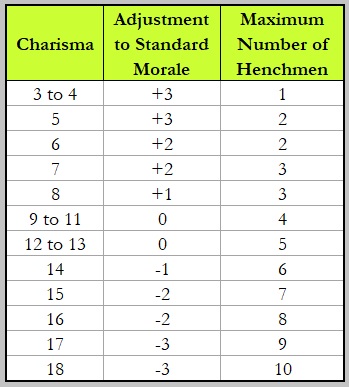Charisma (ability stat)
An ability stat, the measure of the character’s combined physical appearance, persuasiveness and personal magnetism, ranging from a dearth of positive characteristics to an impressive range of social acumen.
Dealings with NPCs, including hirelings, followers, ordinary persons, officials and a wide variety of creatures and monsters will ultimately be resolved through an interactive mechanic composed of conflict cards.
As henchmen are considered fanatically loyal and are run by the player characters, their loyalty is not affected by their liege’s charisma.
The table shown indicates charisma’s adjustment to standard morale, as well as the maximum number of henchmen that a character can ultimately receive as they gain levels. Remember that an increase in morale is not an improvement, as it indicates the number on 2d6 that must be thrown in order for a non-player character to maintain its will to fight.
Description of Values
Measuring charisma is an effort to quantify the effects the ability stat has upon the reactions of others, their spontaneous treatment of the individual and their overall generosity to award the individual with opportunities and status. Low charisma individuals are met with revulsion and distaste, treated with disdain and usually ostracized or left out of social gatherings and organizations. High charisma individuals are met with liking and interest, are treated as desirable and often rise to positions of authority and trust within organizations.
The increase in charisma from ugly to bewitching compounds benefits that each amount of charisma above that level also enjoys (except where it is superseded by a more rewarding benefit). Creatures are capable of being particularly cruel to individuals of low charisma, whatever they might do; while often awarding those of high charisma more than they really deserve, as they often do little to earn it.
The descriptions below only partly describe player characters. For such persons as those detailed here, it will often take years of commitment to rise through the ranks and be discovered for their charisma. Those with very high charismas, above 14, will be much less common than the dice might imaginably dictate. Some may be born with a 16 or more charisma, but a harsh life, accidents, poor health, disease and other consequences may severely diminish their potential. Only those charismatic who are born at least partly to privilege will remain so long enough to enjoy it. Players, of course, fall into this category. They, too, are unusual, even those whose fathers and mothers were common (though the character background generator adjusts their backgrounds with their charisma).
In large degree, it is suggested that a DM recognize that an extraordinarily beautiful and pleasant person moving about a late medieval or early modern world casually, as a cleric, bard, paladin or druid, would likely be seen as something of a freak. The list below is intended to effect that depiction.
Ugly (3pts)
Reactions to such persons will often be a mixture of repugnance and horror, as ugly persons are generally misshapen, frightful and even ghastly in appearance. Unusual color, a rank odour and outward signs that are suggestive of disease (even if no disease is present) is repellent and produces a strong aversion.
Treatment is harsh, as the ugly character tends to be manic, aggressive, needy and often unable to make themselves clearly understood, often due to the shape of their mouths and their lack of confidence, others will treat them with contempt, disrespect, abuse and verbal derision. Mockery is a common response.
Generosity is utterly lacking for such persons; it is extremely rare that they are given a place or means to make a living, unless it is in some role that is wretched or very unpleasant. They are often the victim of some person who cruelly exploits their dreadful condition. Otherwise, they are often too ugly to even beg, and are thus reduced to scavenging for food. Some are taken in and taught to be assassins ~ the only character class such persons can aspire to be, as no other profession would be moved to train them.
